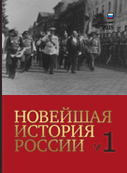
Lieutenant-General of the General Staff N. N. Stogov — A Scrupulous Red Army Military Specialist, or a Notorious “Wrecker” within its Ranks?
Генерального штаба генерал-лейтенант Н. Н. Стогов — добросовестный военный специалист Красной Армии или заведомый «вредитель» в ее рядах?
Keywords: General Staff; RKKA (Red Army); “transfer”; “white agent”
The person at the center of this article (Lieutenant-General of the General Staff of the Russian Imperial Army — Nikolay Nikolaevich Stogov) was directly involved in the “White movement” from the end of 1919 through the evacuation of “White” Crimea in November 1920, during which time he served under the White generals A.I. Denikin and P.N. Wrangel. The “paradox” of the situation was in the fact that before he found himself in the camp of “Whites” (in Denikin Armed Forces of South Russia — AFSR), Stogov had served the Bolshevik regime quite earnestly between the Spring of 1918 and late Autumn 1919. Stogov held the executive post of Chief of the Workers and Peasants Red Army (WPRA) General Staff. The author of this article does not find any serious evidence that N. N. Stogov was an anti-Soviet “white agent”, who was conducting “subversive” activities in the WPRA ranks. What’s more, it appears to make sense that Stogov considered it reasonable to “try his luck” and defect to the “White” movement in the south of Russia after having been arrested twice during less than 2 years in the Red Army and after having seen his career ossify there. N. N. Stogov’s decision was not an exceptional one—more than a dozen Russian General Staff had experienced a similar fate, choosing to serve within the enemy camp during the Civil War (especially after 1919), some even managing to change “masters” more than once.
More...